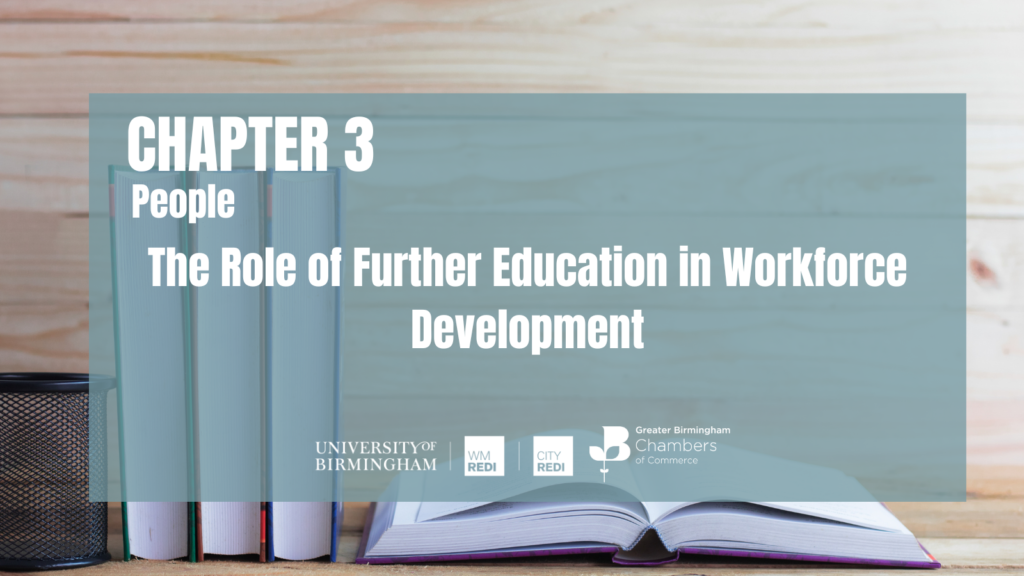
Rebecca Waterfield, Director of Business Development, South and City College Birmingham discusses how Further Education Colleges are crucial for supporting economic growth in Birmingham and the region.
This article was written for the Birmingham Economic Review, published in September 2023.
The review is produced by City-REDI / WMREDI, the University of Birmingham and the Greater Birmingham Chambers of Commerce. It is an in-depth exploration of the economy of England’s second city and a high-quality resource for informing research, policy and investment decisions.
Skills needs in Birmingham
Birmingham is one of the youngest and most ethnically diverse cities in the UK.
That means there is a plethora of talent to support the regional economic growth; the city has access to a talent pool of residents that are meeting current and future skills needs. However, the city also has some of the lowest attainment levels of education and the highest levels of deprivation in the country. This is where Further Education Colleges play a vital role in supporting Birmingham residents to gain the skills and qualifications needed to become the workforce of the future.
The Local Skills Improvement Plan shows that over 75% of employers in the West Midlands have not engaged with FE colleges and many are uncertain of both how to do this and the benefits of doing so. FE colleges have the opportunity to provide a range of skills intervention programmes, enabling companies to access talented individuals who can fill vacancies, as well as help employees gain skills and qualifications for the emerging requirements of the sector.
Misconceptions about Further Education provision
There is a common misconception that colleges only run programmes for young learners starting in September and finishing in June, where you may go if you are not academically strong enough for A Levels and need a more vocational programme. This is not the case. FE Colleges can adapt curriculum to meet employer needs. We can put on tailored pre-employment programmes to help unemployed candidates gain the skills needed to enter work. For example, South & City College Birmingham runs the BBV Construction Gateway, a 6-week programme to help unemployed candidates by getting them to work on HS2.

Upskilling and Apprenticeships
Colleges run a range of upskilling programmes, many of which are funded through the government’s Free Courses for Jobs, to support employers and ensure their workforce is developing the skills needed for the future and can progress within their organisations. This ranges from work-based diplomas in Health or Management to short upskilling programmes in Computer Networking and Security and working on electric and hybrid vehicles. Colleges also offer a wide range of apprenticeship programmes for both new entrants and for upskilling and are keen to work with Employers to expand and bespoke delivery to meet industry needs. As an example, South and City College Birmingham created the National Express Bus and Coach Academy so apprentices are learning on industry-standard equipment that mirrors their workplaces.
Working with employers and local communities
Through local employer advisory boards, colleges encourage employers to work with our teaching staff. This helps us improve the design and delivery of our curriculum, which will be developing our region’s young people to meet future skills needs. Colleges understand this need and want to work with our employers to support all of our learners into work, and to be able to progress within their roles.
Colleges support local communities with accessing education and many have strong community outreach provision to access some groups who are further away from education. By working with colleges, employers can access a more diverse workforce which supports any business to be more successful. Employers whose workforce represents the communities and customers they serve see the benefits of this diversity.
Collaboration is the key. By combining the strength of our employers within Birmingham with the further education community, a recruitment and skills alliance can be formed to ensure we have access to the best talent with the best progression opportunities and therefore support our region to be the most economically successful.
This blog was written by Rebecca Waterfield, Director of Business Development, South and City College Birmingham.
Disclaimer:
The views expressed in this analysis post are those of the authors and not necessarily those of City-REDI / WMREDI or the University of Birmingham.
